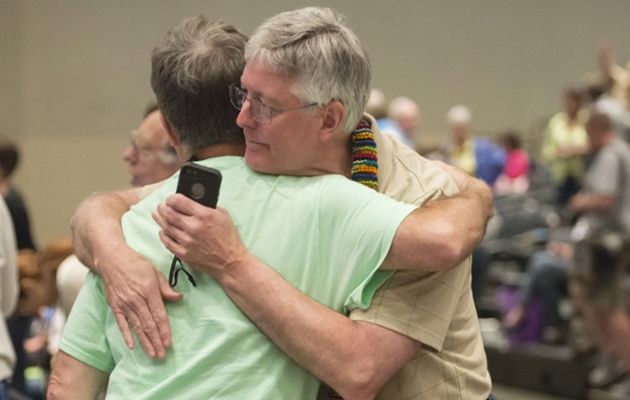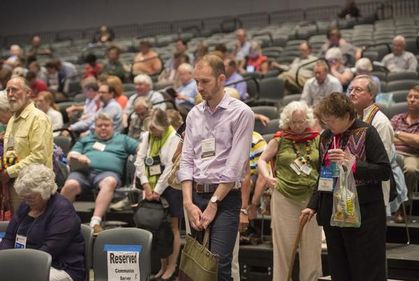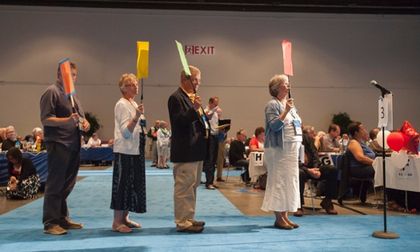Presbyterian Church USA changes its constitution to re-define marriage as "commitment between two people”. The denomination has lost one third of its members in the past 15 years.
 Gary Lyon and Bill Samford celebrate after a vote allowing Presbyterian pastors discretion in marrying same-sex couples / AP Photo
Gary Lyon and Bill Samford celebrate after a vote allowing Presbyterian pastors discretion in marrying same-sex couples / AP Photo
Following years of debate, America’s largest Presbyterian denomination has announced a change to its constitution that allows for “a more inclusive definition of marriage.”
Officially called Amendment 14-F, the marriage contract is now explicitly referred to by the Presbyterian Church USA (known as PCUSA) as “between two people, traditionally a man and a woman" rather than merely "between a man and a woman".
About 71 percent of the leaders approved of the change during a general assembly meeting last June, but it required approval from a majority of the denomination's 171 regional districts, or presbyteries. The critical 86th "yes" vote came on Tuesday night from the Presbytery of the Palisades in New Jersey.
In a video message on the Presbyterian Church website, church official Gradye Parsons confirmed that Tuesday's vote will allow Teaching Elders "wider discretion in whose weddings they may conduct," including same-sex couples.
However, no church leaders will be compelled to conduct a wedding against their conscience, Parsons said. He encourages members to show "respect and genuine care for each other," regardless of differing views on the subject.
 Opening prayer at the 221st General Assembly of the Presbyterian Church / AP/ David Guralnick)
Opening prayer at the 221st General Assembly of the Presbyterian Church / AP/ David Guralnick)
MANY DISAGREE
But not everyone agrees with the change. 41 Presbyteries voted against Amendment 14-F. Because of that, church leaders added a caveat explaining that it “traditionally” occurs “between a man and a woman.”
According to the Washington Post, the church has lost 37 per cent of its membership since 1992, which many attribute to disputes over gay marriage.
The national director of conservative group The Fellowship Community, Paul Detterman, said more people are likely to leave over this latest decision. However, he and others have chosen to stay "because we believe God has called us here."
"We disagree with the outcome of the vote, but our voice is still welcomed in this denomination, and as long as that is the case we have the opportunity to share the Good News of Jesus Christ here", Detterman told Christian Today.
 Presbyterian church commissioners line up at a previous debate and vote in Detroit on allowing gay marriage in 2014. David Guralnick/AP
Presbyterian church commissioners line up at a previous debate and vote in Detroit on allowing gay marriage in 2014. David Guralnick/AP
He added: “Our objection to the passage of the marriage amendment is in no way, shape or form anti-gay. It is in no way intended as anything but concern that the church is capitulating to the culture and is misrepresenting the message of Scripture”.
The Fellowship Community published a statement saying that the church was "disregarding the clear teaching of Scripture, the wisdom of those who have lived and died for the faith before us, and the continuing consensus of the contemporary church around the world."
"To do this is both disobedient and unwise," the statement continued. "We know this particular change was intended by its proponents to extend the grace and the good news of Jesus Christ, and to further the witness of his Kingdom. We believe it accomplishes neither."
PRO-LGBT SAY IT IS "LIBERATION DAY"
Rev Randy Bush of the pro-LGBT church group Covenant Network said the decision signifies the church stepping "forward into a new chapter – one that values our past journeys of faith and respects the importance of pastoral discretion in congregational matters".
“It offers to the world a compelling witness about how God's grace is active in loving, mutual relationships", he added.
"The change aligns the church's constitution with a reality that has long been true: both same-gender and opposite-gender couples have been living in relationships that demonstrate covenant faithfulness, shared discipleship, and mutual love", a statement from the Covenant Network said.
“Some of us are calling it liberation day,” said the Rev. William Blake Spencer, pastor of Ocean Heights Presbyterian Church in Egg Harbor Township, N.J., who is gay and voted with his presbytery on Tuesday. “It will be the last LGBTQ issue that we debate and fight about, and finally our welcome comes without a ‘but’ or an ‘if.’”
The constitution's new wording will take effect on 21st June.
PCUSA has been losing members regularly in the last 15 years. In 2000, 2.5 million believers attended services of the denomination. In 2006, it was 2.2 million, and in 2013, figures had fallen to 1.7 million.

Las opiniones vertidas por nuestros colaboradores se realizan a nivel personal, pudiendo coincidir o no con la postura de la dirección de Protestante Digital.
Si quieres comentar o